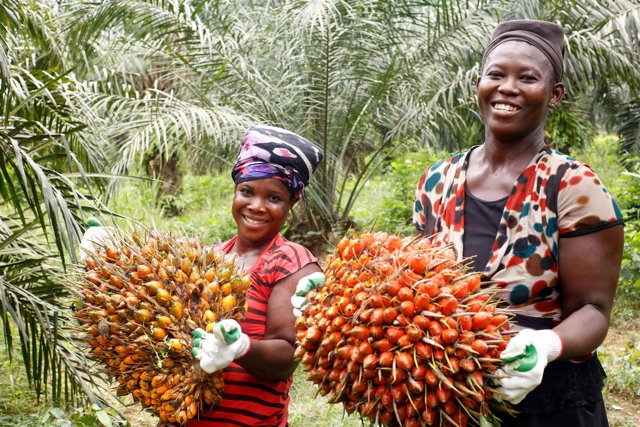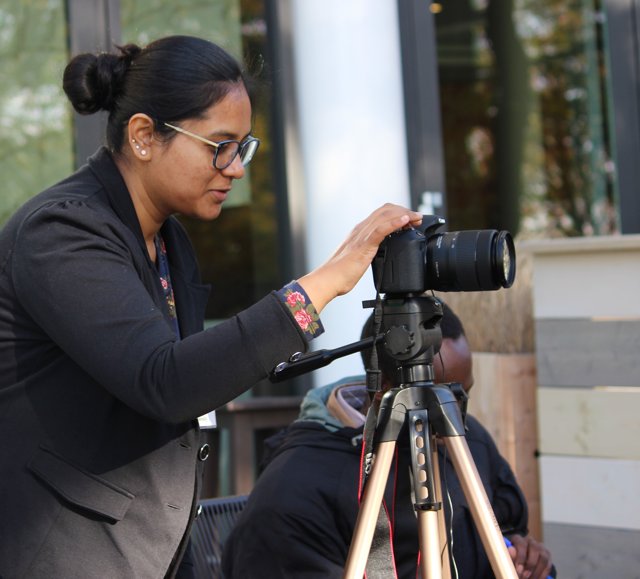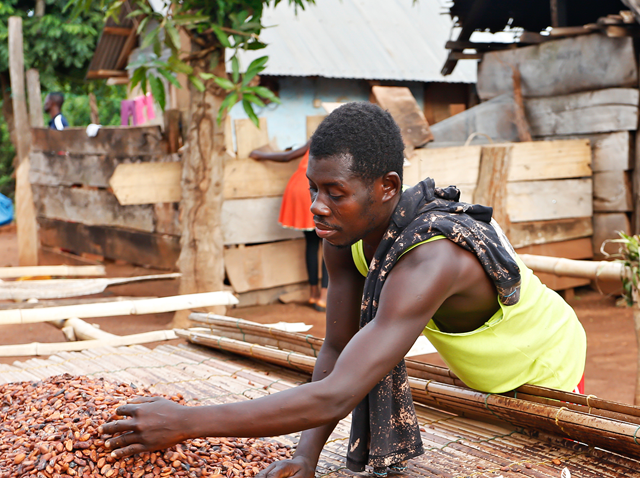Climate-smart agriculture, the silver bullet to attract youth in Africa?
Africa’s workforce population grows by 12 million[1] young people every year, yet the youth unemployment rate remains high. Farming could be an answer, as agriculture represents 60% of employment. But farming has an image problem in large parts of the continent. Many young Africans associate farming with poverty, resulting in an ageing farming population that could threaten food security. According to the African Development Bank (AfDB), Africa has 65% of the world’s remaining uncultivated arable land, enough to feed 9 billion people by 2050.

Young oil palm farmers Sat4Business, Ghana - copyright Solidaridad
And yet the region is spending USD 35 billion a year on food imports.[2] Transforming Africa’s agriculture will not only help attract more youth but also turn it into a breadbasket for the world. The Dutch grant program Geodata for Agriculture and Water (G4AW), coordinated by the Netherlands Space Office (NSO) on behalf of the Dutch Ministry of Foreign Affairs, engages youth in their climate-smart agriculture (CSA) projects by harnessing the power of the private sector.
Transforming agriculture
The main objective of climate-smart agriculture is to sustainably increase agricultural productivity under climate change. Access to digital technology, crucial to any CSA solution, opens up boundless new opportunities to transform Africa’s agricultural industry. It can create jobs and boost sustainable, inclusive growth, plus is making people and businesses in developing countries more resilient to the far-reaching consequences of climate change. This digital transformation could be the key to unlock the potential of Africa’s agriculture, offering opportunities to combat youth unemployment and feed a growing population.
Enablers for transformation
“Many farmers do not want their children to venture into traditional farming because of the misery they have endured. They encourage their children to become public servants, for example, to ensure they have a job in the city with a stable salary. But there are also cases where the children take over the family farm business and modernize it, although they are not yet the majority.” Nawsheen Hosenally knows what she’s talking about. She is the co-founder of Agribusiness TV, operating from Ouagadougou in Burkina Faso.

Nawsheen Hosenally, Agribusiness TV, Burkina Faso
Since 2016, the Web-tv platform broadcasts very popular short videos, showcasing young successful farmers from 12 African countries. “If you see someone like yourself, with the same profile and experience, who has been able to become successful in an agricultural activity, you are encouraged to seek more information. We inspire young people to invest their efforts in agriculture, which is more than farming.” Consultants are needed, as are marketing, financial, and logistic experts, application builders, teachers, and veterinarians. Every expert we talked to acknowledges the perceived lack of perspective as the most important challenge in attracting more youth into the agricultural sector. Peer-to-peer communication is therefore crucial.
Henk van Rikxoort, project leader of the G4AW project Sat4Farming, confirms: “Influential people in the communities create awareness of the possibilities that modernization of working methods and digital tools bring. They spread the word that professionalism and digitization in agriculture create companies other than the back-bending, small-scale farming they know.” Sat4Farming aims to support 100,000 Ghanaian cocoa farmers with a farm development plan, FarmGrow, a well-structured digital tool for improving smallholders’ farming practices and income. As in almost all G4AW projects, they make use of satellite- and geodata applications.

Cocoa farmer, Sat4Farming project, Ghana - copyright Rainforest Alliance
Financial services
Another priority to boost the image of agriculture are financial services for agricultural entrepreneurs. It is not so much the initial upfront capital to get a business off the ground which is a threshold, but the money to keep the business running and achieve scalability. Climate change will have a significant impact on agriculture, reflecting the close link between climate and productivity. This is why in many G4AW projects there is a special focus on creating easier access to financing for smallholder farmers in order to mitigate potential risks.
This is also the case for the G4AW Sat4Business project via local financial service providers in Ghana. “Getting access to loans, insurances and pensions is easier because the potential business risks for the providers are reduced. Via a ‘financial technology platform' the service providers gain insight into the size and quality of the plots and crops of individual farmers. This is combined with facts on local climate risks and – in this case – today’s cacao market. These kinds of innovations inspire young men and women to change their perception of farming”, concludes Henk van Rikxoort, who is in good contact with the Sat4Business project.
Center of excellence
Mavo Diami in Angola is a G4AW project supporting climate-smart agriculture. The project aims to improve crop management and self-reliance of (smallholder) farmers. Together with Wageningen University (WUR, the agricultural university of the Netherlands) and the Faculty of Agriculture of Universidade José Eduardo dos Santos (UJES) in the Huambo province of Angola, the project is partner in the recently established Center of Excellence (CoE) at the Faculty. The center aims to boost remote-sensing activities (satellite scanning of the earth in order to obtain information) in Angola and creates employment for graduates in collaboration with Mavo Diami. “We educate the youth at different levels to bring their agricultural knowledge up to date and teach them how to use satellite data. We train them to become consultants and how to benefit from database techniques”, says Ms. Nadège Sango Afonso, the Private Sector Development (PSD) coach on behalf of the Netherlands Enterprise Agency (RVO), which facilitated the center.
An estimated 9 billion people will need to be fed by the year 2050. This challenge puts enormous pressure on the availability of water and fertile land, especially under climate change. The G4AW program believes part of the solution lies in science and digital technology. By using space solutions for smallholder farmers we can improve food security, build climate resilience and create decent employment for millions of young people.
This article was published on International Youth Day celebrated on August 12 every year. This day gives an opportunity to celebrate and mainstream young peoples’ voices, actions and initiatives, as well as their meaningful, universal and equitable engagement.
[1] African Development bank, 2016. Jobs for Youth in Africa.
[2] Feed Africa – Strategy for agricultural transformation in Africa 2016-2025.